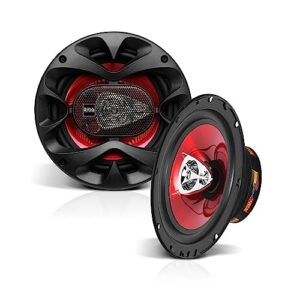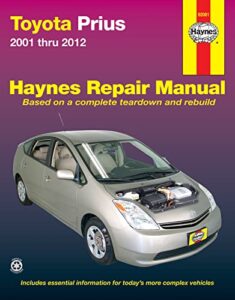As an Amazon Associate, I earn from qualifying purchases
Have you ever wondered how much a Toyota Prius weighs? Whether you’re curious about fuel efficiency, handling, or safety, knowing your car’s weight plays a key role.
Understanding this simple number can help you make smarter choices when driving, parking, or even maintaining your Prius. Keep reading to discover the exact weight of a Toyota Prius and why it matters to you every time you get behind the wheel.
Toyota Prius Weight Basics
The Toyota Prius is a popular hybrid car known for its fuel efficiency. One key aspect of this vehicle is its weight. Understanding the Prius weight basics helps buyers and owners know more about its performance and handling. Weight affects fuel economy, safety, and driving experience. Let’s explore some important details about the Toyota Prius weight.
Curb Weight Explained
Curb weight means the total weight of the car with all standard equipment. It includes fluids like oil and fuel but no passengers or cargo. This weight affects how the car drives and how much fuel it uses. The Prius has a curb weight that balances lightness and strength.
Variations By Model Year
The Prius weight changes slightly with each model year. Newer models may be heavier due to added safety features and technology. Older models tend to weigh less. These changes show how Toyota improves the car while keeping it efficient.
Impact Of Trim Levels
Trim levels also affect the Prius weight. Higher trims add features like bigger wheels, extra seats, or better sound systems. These add-ons increase the car’s weight. Lower trims are lighter and more basic. Choosing a trim depends on what features matter most to the buyer.

Credit: www.santacruztoyota.com
Weight Differences Among Prius Models
The Toyota Prius lineup includes several models, each with different weights. Weight affects fuel efficiency, handling, and performance. Knowing the weight differences helps choose the right Prius for your needs.
Standard Prius
The standard Prius weighs about 3,000 pounds. This weight comes from its hybrid battery and fuel-efficient engine. It balances lightness and safety well. The weight helps it achieve excellent gas mileage.
Prius Prime
The Prius Prime is a plug-in hybrid version. It weighs around 3,300 pounds. The extra weight comes from a larger battery pack. This allows for longer electric-only driving. Despite the weight, it remains fuel-efficient.
Prius C And V
The Prius c is the smallest and lightest model, at about 2,600 pounds. It suits city driving with its compact size. The Prius v is larger and heavier, near 3,400 pounds. It offers more cargo space and a roomier interior.
Factors Affecting Prius Weight
The weight of a Toyota Prius varies based on several key factors. These factors influence the car’s overall mass and affect its performance and fuel efficiency. Understanding what changes the weight helps buyers and enthusiasts make informed decisions.
Battery Size And Type
The Prius uses different battery types over its models. Larger batteries add more weight to the car. Lithium-ion batteries tend to weigh less than older nickel-metal hydride ones. Battery size depends on the model and hybrid system used. This variation impacts the total weight significantly.
Additional Features And Options
Extra features increase the Prius’s weight. Options like sunroofs, advanced audio systems, and safety packages add mass. Each added feature requires materials and components that add pounds. Buyers who choose more options often get heavier vehicles. This affects fuel economy and handling slightly.
Material Choices
Toyota uses different materials in the Prius body and frame. Lightweight metals like aluminum reduce weight. Steel parts add durability but increase mass. Some models use more plastic and composites to save weight. Material choice balances strength, cost, and fuel efficiency.
Weight Impact On Performance
The weight of a Toyota Prius affects how it performs in daily driving. Weight impacts fuel use, handling, and speed. Understanding this helps drivers know what to expect from their car.
The Prius is lighter than many cars, which helps with efficiency and control. Below, we explore how weight influences key performance areas.
Fuel Efficiency
A lighter car needs less energy to move. The Prius’s weight helps it use less fuel. This means it saves money on gas and produces fewer emissions.
Weight reduction is key to the Prius’s hybrid system working well. It balances power and economy smoothly.
Handling And Stability
The Prius’s weight affects how it handles turns and roads. A moderate weight keeps the car stable but easy to steer. It feels balanced and safe on the road.
Too much weight can make steering slow. Too little weight may reduce grip. The Prius strikes a good middle ground for everyday driving.
Acceleration
Weight impacts how fast the Prius can speed up. A lighter car accelerates more quickly with less effort. The Prius has enough weight for smooth starts without lag.
This helps in city traffic and merging onto highways. The car responds well without feeling heavy or slow.
Comparing Prius Weight To Other Hybrids
Comparing the weight of the Toyota Prius to other hybrid cars helps us understand its place in the market. Weight affects fuel efficiency, handling, and overall performance. The Prius is often seen as a benchmark for hybrid vehicles. Knowing how it stacks up against similar models can guide buyers who want a balance between weight and efficiency.
Different hybrids vary in weight due to battery size, materials, and design choices. These differences impact driving experience and fuel economy. Let’s explore how the Prius compares with other hybrids and what trade-offs come with their weights.
Similar Models
The Toyota Prius weighs around 3,000 to 3,100 pounds. This weight is typical for compact hybrids. For example, the Honda Insight weighs about 3,200 pounds, slightly heavier than the Prius. The Hyundai Ioniq Hybrid is lighter, around 2,900 pounds. The Ford Escape Hybrid, a small SUV, weighs more, near 4,000 pounds. These examples show Prius sits in the middle of the range.
Weight differences come from size and battery capacity. Smaller hybrids tend to be lighter, while SUVs and larger models weigh more. Prius’s weight helps it remain efficient but still practical for daily use.
Weight Vs. Efficiency Trade-offs
Heavier cars often use bigger batteries for longer electric driving. This can improve fuel efficiency but adds weight. Lighter cars use smaller batteries and may have less electric range. Prius balances weight and battery size for good fuel economy and handling.
Some hybrids sacrifice weight for comfort or space. This can lower fuel efficiency but improve ride quality. Prius focuses on saving weight to maximize miles per gallon. This balance makes it popular among eco-conscious drivers.

Credit: en.wikipedia.org
How Weight Influences Safety
The weight of a Toyota Prius plays a key role in its safety on the road. Weight affects how the car handles crashes and protects passengers. A heavier car often absorbs impact better, helping reduce injury risks. Understanding this helps buyers see why weight matters beyond fuel efficiency.
Crash Test Ratings
Crash tests measure how well the Prius protects people inside. The car’s weight influences test results. Heavier cars generally score higher in crash tests. The Prius achieves good ratings because its weight supports strong impact resistance. These scores show the Prius is a safe choice for drivers and passengers.
Structural Integrity
The Prius’s structure is built to use its weight wisely. Strong materials and design keep the car firm during collisions. Weight adds stability, helping the frame absorb crash forces. This keeps the cabin intact and passengers safer. The right balance of weight and strength improves overall safety.
Safety Features
Weight affects how safety features like airbags and seat belts work. A well-weighted car helps these systems perform better. The Prius’s weight supports quick airbag deployment and proper seat belt tension. Together, these features protect occupants effectively in accidents. Weight is a key factor in making safety technology reliable.
Tips For Managing Vehicle Weight
Managing the weight of your Toyota Prius helps improve fuel efficiency and driving comfort. A lighter vehicle uses less energy. It also reduces wear on brakes and tires. Here are some simple tips to keep your Prius as light as possible.
Reducing Unnecessary Load
Remove items you do not need from the car. Check the trunk and back seats regularly. Extra weight from heavy bags or tools can slow your Prius. Keep only essential items inside. This small step can save fuel and improve handling.
Choosing The Right Accessories
Select lightweight accessories for your Prius. Avoid heavy roof racks or large carriers. Use slim floor mats and simple seat covers. Lightweight parts reduce the total weight. This helps maintain better mileage and performance.
Maintenance To Optimize Weight
Keep your Prius well maintained for optimal weight management. Check tire pressure regularly. Properly inflated tires reduce rolling resistance. Remove old or broken parts that add extra weight. Regular cleaning removes dirt and debris that can weigh down the vehicle.

Credit: www.quantrellforlife.com
Frequently Asked Questions
What Is The Average Weight Of A Toyota Prius?
A Toyota Prius typically weighs between 3,000 and 3,500 pounds.
How Does Prius Weight Affect Fuel Efficiency?
Lighter weight helps the Prius use less fuel and drive farther on a tank.
Does The Prius Weight Vary By Model Year?
Yes, newer models may weigh slightly more due to added features and safety gear.
How Much Does A Prius Battery Add To Its Weight?
The hybrid battery adds around 100 to 150 pounds to the total weight.
Is The Prius Heavier Than Other Hybrid Cars?
The Prius is generally lighter than many hybrids, aiding its fuel economy.
How Does Prius Weight Impact Its Driving Performance?
The Prius’s moderate weight offers good balance between smooth ride and handling.
Conclusion
The Toyota Prius weighs between 3,000 and 3,500 pounds. This weight helps it balance fuel efficiency and safety. Lighter cars often use less fuel, but need strong parts for protection. Knowing the Prius’s weight helps you understand its performance and handling.
This info can guide your decision if you plan to buy or compare cars. Weight matters for parking, speed, and driving comfort too. Remember, each Prius model may weigh a bit differently. Overall, the Prius weight supports its role as an eco-friendly, reliable car.
As an Amazon Associate, I earn from qualifying purchases


